NoTrend
Well-Known Member
International Jazz day celebrated in Japan with +2h30 of music selected by three renowned J-Jazz collectors. Only available for 24h.
that black artists group lp is no joke. highly recommended if you haven't heard it
International Jazz day celebrated in Japan with +2h30 of music selected by three renowned J-Jazz collectors. Only available for 24h.
Blank Forms are releasing two Masayuki Takayanagi New Direction Unit live LPs - Axis/Another Revolvable Thing 1 and 2. I couldn't be more stoked. Black Editions I believe at some point are releasing some cannon of his discography soon too. For those into Free Jazz, pre harsh noise/avant Japanese scene, you will want these.
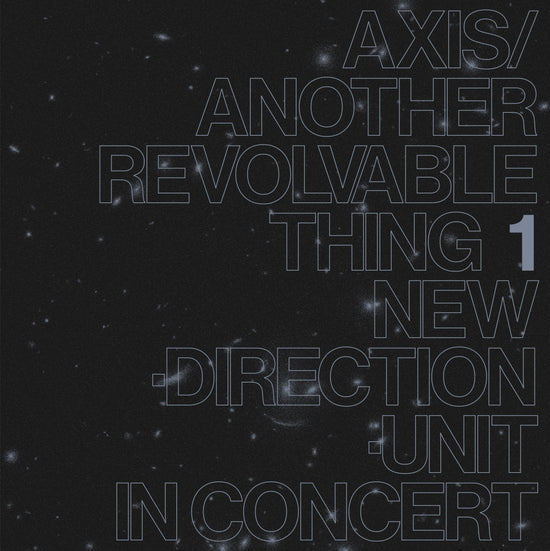
Axis/Another Revolvable Thing is the second installment of Blank Forms’ archival reissues of the music of Japan’s eternal revolutionary Masayuki Takayanagi, following April is the cruellest month, a 1975 studio record by his New Direction Unit. Comprised of recordings of a September 5, 1975 concert by the New Direction Unit at Yasuda Seimei Hall in Tokyo’s Shinjuku district, the two volumes showcase Takayanagi in deep pursuit of what he began calling “non-section music” after leaping beyond the confines of his prior descriptor “real jazz.” The quartet of Takayanagi (guitar), Kenji Mori (reeds), Nobuyoshi Ino (bass, cello), and Hiroshi Yamazaki (percussion) deftly explores the twin poles of Takayanagi’s spacious “gradually projection” and explosively virulent “mass projection” concepts across six pieces, titled Fragments I - VI and split between the two LPs.
As part of his liner notes for Part 1 (newly translated for this edition), noted Japanese free jazz critic Teruto Soejima wrote:
New Direction Unit performances always emit the smell of blood. Fresh blood, never blood that is old or crusted. This is not the desiccated shell of music, it’s sound through which pumps the blood of living human beings. Blood that seethes, that flows and counterflows, that blazes, runs, rises and congeals, blood that vomits and spurts. Vivid, scarlet blood. The ultimate beauty that Takayanagi aims at, is it not the color of this blood?
Blood calls out to blood. For these four musicians, playing together means feasting on each other’s blood. It is also a summon- ing to a secret blood oath, to the creation of solidarity with the audience. In the moment, truly, the situation and beauty are instanta- neously unified. To borrow the title of a movie by Kōji Wakamatsu: blood is redder than the sun.
Masayuki “Jojo” Takayanagi (1932 - 1991) was a maverick Japanese guitarist, a revolutionary spirit whose oeuvre embodied the radical political movements of late ‘60s Japan. Having cut his teeth as an accomplished Lennie Tristano disciple playing cool jazz in the late ‘50s, Takayanagi had his mind blown by the Chicago Transit Authority’s “Free Form Guitar” in 1969 and promptly turned his back on the jazz scene by which he was beloved, going as far as to call his former peers and admirers “a bunch of losers” in the press. Takayanagi had found a new direction, an annihilation of jazz and its associated idolatry of hegemonic American culture. Aiming his virtuoso chops towards the stratosphere, Takayanagi dedicated himself to the art of the freakout, laying waste to tradition left and right, most notably via the all-out assault of his aptly-named New Direction for the Arts (later New Direction Unit) and collaborations with like-minded outsider saxophonist Kaoru Abe. His innovations on the instrument parallel those of Sonny Sharrock and Derek Bailey and paved the way for the Japanese necromancy of Keiji Haino and Otomo Yoshihide, but even at its most limitless hurdling Takayanagi’s playing is propelled by the dexterous grasp of his foundations, to which he paid tribute with elegant takes on flamenco and Ornette Coleman’s “Lonely Woman.” In the autumn of his life, Takayanagi’s solo Action Direct performances made him one of the first guitarists, alongside but independent of Keith Rowe, to use tabletop guitar for pure noise improvisation.
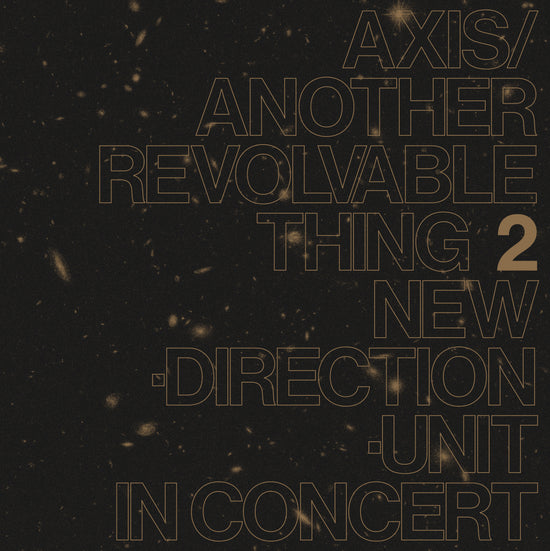
Axis/Another Revolvable Thing is the second installment of Blank Forms’ archival reissues of the music of Japan’s eternal revolutionary Masayuki Takayanagi, following April is the cruellest month, a 1975 studio record by his New Direction Unit. Comprised of recordings of a September 5, 1975 concert by the New Direction Unit at Yasuda Seimei Hall in Tokyo’s Shinjuku district, the two volumes showcase Takayanagi in deep pursuit of what he began calling “non-section music” after leaping beyond the confines of his prior descriptor “real jazz.” The quartet of Takayanagi (guitar), Kenji Mori (reeds), Nobuyoshi Ino (bass, cello), and Hiroshi Yamazaki (percussion) deftly explores the twin poles of Takayanagi’s spacious “gradually projection” and explosively virulent “mass projection” concepts across six pieces, titled Fragments I - VI and split between the two LPs.
As part of his liner notes, newly translated for this edition, for Part 2, noted Japanese free jazz critic Teruto Soejima wrote:
Every time I hear a performance by New Direction Unit, for some reason I get carried away by the illusion that I can see their sound. A red hot chaos, woven together from percussion, reeds, and bass or cello. Then, jetting out from within it, traveling at dizzying speed, the sound of the guitar, shooting pleasantly right through the center of our cerebellums from front to back. And at that moment, we stomp on the gas of our awareness and our imagination, careening off in hot pursuit of the group.
I can see, I can hear each individual sound of the performance. The musicians listen intently to each other, their terrifyingly precise concentration creating clusters and lattices of sound. The music’s structures arise from perfect interplay. As those structures become gradually denser, a sense of time arises. Exactly like the moment when the first amoeba on earth came into existence. Time is already in rapid motion. And then, when all the performance variables align perfectly, like a rubber band, time stretches out towards the infinite. Thrust, acceleration... This is not the music of Ligeti or Xenakis, it’s the music of New Direction Unit.
Pre order https://blankforms.org/publications/

 www.blackeditionsgroup.com
www.blackeditionsgroup.com
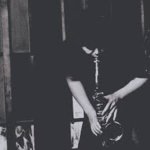
@Mr Moore @Dtknuckles might be something you guys like? I also tagged @NoTrend until I saw that I was referencing his postAlso can't recommend this enough, for more of you free jazz people, ...especially for those into Kaoru Abe. This got reissued last year, but just posting in case those interested have not seen..
Makoto Kawashima Homo Sacer

BE-006/211: Makoto Kawashima Homo Sacer | Black Editions Group
Makoto Kawashima, Homo Sacer. Deluxe LP with digital download from the Black Editions catalog. His debut album.www.blackeditionsgroup.com
View attachment 44122
Black Editions is proud to present the first-ever vinyl edition of Homo Sacer, Japanese saxophonist Makoto Kawashima's debut album and the final release by the legendary P.S.F. Records.
Though he has played the saxophone for just over 10 years, Makoto Kawashima has emerged as one of the most original improvisers in a new generation of Japanese players. His releases on his own Homosacer label as well as on this, his debut reveal a haunting and impassioned style of playing.
"Homo Sacer -- Sacred Human. Kawashima's sax is ripe with the spirit of Japanese free jazz, dwelling as it does between the violent and the beautiful. Kaoru Abe, Masayoshi Urabe, Takayuki Hashimoto, Harutaka Mochizuki... all of these altoists live in an area of personal expression rare in the world, one that feels like the body itself is being whittled away at. It feels like we have a new genius to add to that list." --Hideaki Kondo, from the Japanese liner notes
A solo sax set? That may be tough. Looked for it on YouTube. But that 20$ price makes it look pretty nice.@Mr Moore @Dtknuckles might be something you guys like? I also tagged @NoTrend until I saw that I was referencing his post
It depends on your mileage. I am a huge Abe fan and his solo sax stuff was his bread and butter so to speakA solo sax set? That may be tough. Looked for it on YouTube. But that 20$ price makes it look pretty nice.
It depends on your mileage. I am a huge Abe fan and his solo sax stuff was his bread and butter so to speak
Ok I found the stream of the b side on band camp.It depends on your mileage. I am a huge Abe fan and his solo sax stuff was his bread and butter so to speak
I second this - Black Editions exists for PSF reissues. PSF was not only one of the best Japanese labels, but the best labels period. 13 years ago I was lucky enough to go to the PSF record store, which was basically an apartment in Tokyo. Ikeezumi-san was so welcoming me and as soon as I mentioned Keiji Haino and Kaoru Abe he just loaded me up with so many records. It was awesome. Such a shame he passed so young. But he was super nice and we "talked" aka tried to translate about Hijokaidan and Osaka scene.If you guys want to purchase Kawashima's album on Black Éditions, I strongly suggest to add Go Hirano - Corridor Of Daylights. It's very different from Kawashima's, it's not even jazz but you'll have a beautiful record full of quiet and ambiant songs. I listened to it on Bandcamp this morning and I am ready to place an order.
I second this - Black Editions exists for PSF reissues. PSF was not only one of the best Japanese labels, but the best labels period. 13 years ago I was lucky enough to go to the PSF record store, which was basically an apartment in Tokyo. Hiedo-san was so welcoming me and as soon as I mentioned Keiji Haino and Kaoru Abe he just loaded me up with so many records. It was awesome. Such a shame he passed so young. But he was super nice and we "talked" aka tried to translate about Hijokaidan and Osaka scene.
That Fushitsusha black editions re-issue I hear is going to be 5xLP, it's going to be massive. I really do hope they reissue that Kaoru Abe release from PSF (I believe there are two?)
For anyone into how experimental music changed from 84-2015, PSF is a great guidem and the care black editions is doing is also great. I also am glad they aren't caving in and trying to cater to record collectors by including OBIs. Granted they did for the CDs but because pretty much post I think Late 80s they mostly stopped doing vinyl, it kinda makes sense. Also when talking to Black Editions, they really want to keep their records affordable and in print, which is really cool. I own every single release, and every one of them is worth owning, highest recommendation.
It is also my understanding they bought the whole PSF catalog for US. We may not get everything, but we are certainly going to get more than just the heavy hitters we know outside of Japan.
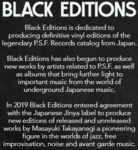
The vinyl releases from Takayanagi I posted last week are from Blank Forms, which is an art collective. I think those are not a part of Jinya. For example, the Masayuki Takayanagi New Direction Unit – April Is The Cruellest Month LP from blank forms was actually a record he recorded for ESP-DISK in 1975 but the label went under. It is a record I highly recommendYep, they released quite a few PSF records (including luxury compilations) from what they say on their website, they made a deal with Jinya and will release, at least, more Masayuki Takayanagi music. Jinya in Japan is releasing two CD for now, Station 70' (Takayanagi + Abe) and Live at JazzBed (Takayanagi + Abe + Yamazako). Maybe Black Editions will be in charge of the vinyl releases?
View attachment 45433
:format(jpeg):mode_rgb():quality(90)/discogs-images/R-13676363-1558809373-5274.jpeg.jpg)
Yep, they released quite a few PSF records (including luxury compilations) from what they say on their website
If you guys want to purchase Kawashima's album on Black Éditions, I strongly suggest to add Go Hirano - Corridor Of Daylights. It's very different from Kawashima's, it's not even jazz but you'll have a beautiful record full of quiet and ambiant songs. I listened to it on Bandcamp this morning and I am ready to place an order.
Yeah steve is awesome, good buy. He wrote a John Fahey book that is really goodI’ve been in contact with Steve from that label. And he gave me a few suggestion. They have a lot of great stuff all under $30. I am probably placing an order today for the Go album.
listened to the Kawashima album this morning through the headphones. It’s definitely a fascinating album.
Yeah steve is awesome, good buy. He wrote a John Fahey book that is really good
I mean I'm bias, but again any record from black editions is totally worth it, they have really chosen each one carefully. Not all of them are jazz, and TBH most PSF releases weren't , but any of them are worth your time
Yeah Steve's label is great, VDSQ, especially if you like American Primitive stuff. Or almost stuff like Jackson C Frank. I highly recommend Chris Brokaw - End of the Night and Michael Chapman Solo Acoustic Vol 11. Really awesomeThe two other labels are good also. When I spoke to him he said go to their site so you don’t have to pay shipping on each record rather than going through band amp
Yeah Steve's label is great, VDSQ, especially if you like American Primitive stuff. Or almost stuff like Jackson C Frank. I highly recommend Chris Brokaw - End of the Night and Michael Chapman Solo Acoustic Vol 11. Really awesome
The ATM record is cool. If you wanna melt your face off i'd get the High Rise record. That may be my fave thing on Black Editions besides the Keiji Haino record.the packaging is top notch as well. I’m eyeing that Acid Mothers Temple...album.
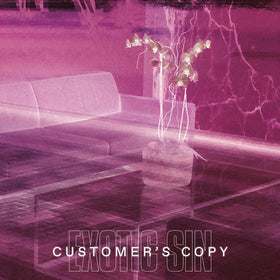
More Japanese Avant/Free Jazz from Blank Forms. Stoked on this as well. A bit more out there, and verges on drone and even minimalist composition
Exotic Sin: Customer's Copy
Customer’s Copy is the debut LP of contorted cosmic jazz and eccentric minimal electronics by Exotic Sin. The duo of Naima Karlsson and Kenichi Iwasa first came together for a performance celebrating the art and music of Karlsson’s grandparents, Moki and Don Cherry, before continuing as an independent unit that still incorporates some of the Cherrys’ instruments as well as their synergetic integration of music with artistic practice.
Preferring the stark contrast of analog/digital, acoustic/electric, and natural/unnatural sounds, Karlsson contributes synthesizers in addition to piano, celesta, and bells, while Iwasa collides anachronistic 90s Yamaha keyboard and guitaret with contrabass recorder, drums, kalimba, and three of Don Cherry’s instruments: one of his trumpets as well as two of his “zen saxophones,” handmade woodwinds appending reed mouthpieces to plastic plumbing parts, also called Don’s kettles after their high-pitched sound. With such timbral juxtapositions, the spirit of Exotic Sin is reminiscent of a number of leftfield jazz-meets-electronics ‘70s duos from Don Cherry’s maverick collaborations with Jon Appleton and Terry Riley to Anthony Braxton’s work with Richard Teitelbaum, İlhan Mimaroğlu and Freddie Hubbard’s Sing Me a Song of Songmy, and Muhal Richard Abrams’ electronic works. On album opener “Dot 2 Dot,” Karlsson’s measured, monastic piano sets an elegiac stage for kettle bends and absurdist electro-percussive filtering courtesy of Iwasa before a flourish of cascading ebonies and ivories together with restorative circular trumpet motifs bring the sidelong piece to a majestic resolution. Named after the character from Ridley Scott’s 1989 film Black Rain, the schizosphere of “Charlie Vincent” interfaces ominous, dystopian synthesizer with permuted organ swells before album closer “Canis Minor” sets gentle sail for a distant bed of lonesome stars.
A visual artist as well as an archivist and coordinator for the Cherry estate, Karlsson continues to learn and study Don’s compositions and approach to piano with her uncles Eagle-Eye and David, who were taught by Don himself, and his use of short piano compositions as loose scaffoldings for improvisation is prevalent across the record’s three otherworldly unfurlings. Improvisor and multidisciplinary artist Kenichi Iwasa is also known for his legendary Krautrock Karaoke night, his contribution to Beatrice Dillon’s 2020 album Workaround, and collaborations with visual artists and musicians from Linder Sterling to members of Can, Neu!, Faust, Cluster, and Wire. Recorded and mixed, with additional alto flute, woodwinds, and contrabass recorder by Robbie Lee.

order here